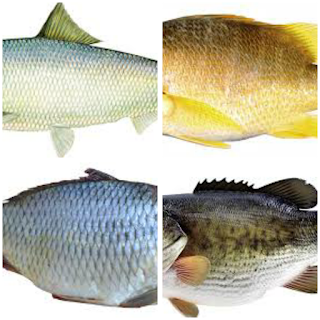What is a pescetarian?
- Get link
- X
- Other Apps
What is a pescetarian?
A pescetarian is a person that only eats fish they obtain from eating any land animal " example steak, chicken, pork, any animal that has flash and walked on land . Also a Pescetarian is closer to a vegetarian with the exception of fish. Vegetarians do not eat any meat at all not even fish. A pescetarian is very close to a Rastafarian they are only similar in food. But some Rastafarians will only eat fish. Pescetarian eat fish and shrimp it takes 24 to 72 mins for the human body to digest fish.
Being a pescatarian takes all the benefits that vegetarians experience, such as being more likely to consume a wide variety of vegetables, whilst also getting high quality protein, omega 3s and other nutrient sources in the form of fish.
Being a pescatarian takes all the benefits that vegetarians experience, such as being more likely to consume a wide variety of vegetables, whilst also getting high quality protein, omega 3s and other nutrient sources in the form of fish.
When on the other hand people that eat all types of meat it takes them long to digest a serving of pork, chicken, beef.
Listen it takes Pork longer to digest because pigs don't sweat so no sweat glance means harmful toxins remain in the pigs body and in the meat. Parasites began to attack the flesh of the pig . And in some case pigs are not butchered properly and still consumed by humans.
Listen it takes Pork longer to digest because pigs don't sweat so no sweat glance means harmful toxins remain in the pigs body and in the meat. Parasites began to attack the flesh of the pig . And in some case pigs are not butchered properly and still consumed by humans.
1) A pig is a real garbage gut. It will eat anything including urine, excrement, dirt, decaying animal flesh, maggots, or decaying vegetables.
2) Pork is one of the most difficult to digest. Pork takes approximately four and a half to five hours to digest. What's important to note about foods that take a significantly longer time to digest than others is that any easily digestible foods are held in the stomach until the slowest digesting foods are released. During this lay time, fruit, vegetables, and other fast-digesting foods begin to ferment—producing gas.
3) The meat and fat of a pig absorbs toxins like a sponge. Their meat can be 30 times more toxic than beef or venison.
4) Farmers will often pen up pigs within a rattlesnake nest because the pigs will eat the snakes, and if bitten they will not be killed by the venom.
5) When a pig is butchered, worms and insects take to its flesh sooner and faster than to other animal's flesh. In a few days the swine flesh is full of worms.
6) Swine and pigs have over a dozen parasites within them, such as tapeworms, flukes, worms, and trichinae.
7) Depending on the cut, at its worst, pork may have more fat content than beef at its worst.
8) Cows have a complex digestive system, having four stomachs. It thus takes over 24 hours to digest their vegetarian diet causing its food to be purified of toxins. In contrast, the swine's one stomach takes only about 4 hours to digest its foul diet, turning its toxic food into flesh.
9) The trichinae worm of the swine is microscopically small, and once ingested can lodge itself in our intestines, muscles, spinal cord or the brain. This results in the disease trichinosis. The symptoms are sometimes lacking, but when present they are mistaken for other diseases, such as typhoid, arthritis, rheumatism, gastritis, MS, meningitis, gall bladder trouble, or acute alcoholism.
Benefits of a vegetable and fish diet:
vegetables and fish should be the basis of any healthy diet. Together they provide essential vitamins and minerals, fiber and lean protein. To ensure that you get the proper nutrients while on a diet, eat a variety of colors of fruits and vegetables, as well as different types of fish. Many diet plans, such as the Mediterranean, Dietary Approaches to Stop Hypertension, or DASH, and the Therapeutic Lifestyle and loving your self to want better and a morw healthier life style
The human body can’t naturally produce omega-3s, but yet they’re needed for a healthy body, inside and out. Although the link between omega-3s and heart health has long been known, several new studies present even more evidence that fish high in fatty acids is essential for total-body wellness.
Benefits of fish
Reduce Alzheime
Prevent Heart Diseas
Improve Skin and hair
Ease Depression
Boost Brain Development
Stronger Sperm
Some vegetables you should look for
Red peppers contain vitamin C, while carrots get their orange color from beta carotene. The 2010 Dietary Guidelines for Americans recommend vegetables in a variety of colors, with a focus on dark green, red and orange vegetables, and beans and peas. To get the recommended minimum intake of 2 1/2 cups for women and 3 cups for men, make sure at least one quarter of your plate is vegetables.
Longevity studies of vegetarians produce conflicting data. Some studies do not show that vegetarians live significantly longer.25,29 Two studies of people who consumed very little meat showed an average life-span increase of 3.6 years.39 A huge study of Seventh Day Adventists who ate little or no meat showed longevity increases of 7.28 years in men and 4.42 years in women.40 These data are confounded by the fact that Seventh Day Adventists follow healthy lifestyles free of tobacco and alcohol.
Studies suggest that the longevity benefits conferred by a vegetarian diet dissipate as humans enter their ninth decade.39 This implies that while vegetarian diets reduce disease risk, restricting one’s diet to only plant foods does not completely protect against the effects of aging.
- Get link
- X
- Other Apps




Comments
Post a Comment